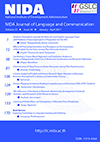Using e-Mapping to Improve Reading Comprehension and Summary Skills of EFL Students
Main Article Content
Abstract
The objective of this investigation was to enhance reading comprehension and summary skills of EFL students through electronic mind mapping for the purpose of analyzing and summarizing reading passages. The purposive sampling method was applied by selecting 50 second-year English major students. The instrument used was 14 reading passages which the students analyzed for the entire second semester of 2015 and each passage was intended for use in a three-hour period in one week. The students were required to read and analyze the text before each lesson, both in groups and individually for classroom presentation and discussion. Suggested answers were given by the teacher at the end of each class. The data were collected by using pre- and posttests, as well as a questionnaire, and interviews. The test scores were then analyzed statistically for mean and standard deviation whereas the data from the questionnaire and interview were analyzed for percentage and also descriptively. The analysis results revealed that, for comprehension skills, the mean of the pre-test was 5.86 with a standard deviation of 1.51, whereas the posttest exhibited a mean of 7.32 with a standard deviation of 1.04. For summary skills, the mean of the pre-test was 4.70 with a standard deviation of 1.42, while the posttest results showed a mean of 6.38 with a standard deviation of 1.07. The data from the questionnaire and interview indicated that this approach enabled the students to analyze and summarize the contents of the reading passages better, faster and more accurately. The majority of the students perceived the technique to be beneficial for analyzing the gist of a reading passage.
Article Details
ข้อกำหนดลิขสิทธิ์
- บทความที่ตีพิมพ์ในวารสาร NIDA Journal of Language and Communication ถือเป็นสิทธิ์ของผู้เขียนบทความกับคณะภาษาและการสื่อสารเฉพาะในการตีพิมพ์ครั้งแรกนี้ หลังจากนั้น ถือเป็นสิทธิ์ของผู้เขียนเท่านั้น ผู้ใดต้องการตีพิมพ์ซ้ำ ต้องได้รับอนุญาตจากผู้เขียนก่อน
- กองบรรณาธิการจะส่งวารสารที่มีบทความของผู้เขียนตีพิมพ์ให้แก่ผู้เขียนจำนวน 2 ฉบับ หากผู้เขียนขอรับวารสารที่มีบทความที่ตีพิมพ์เพิ่มเติม สามารถส่งคำขอมายังบรรณาธิการ

